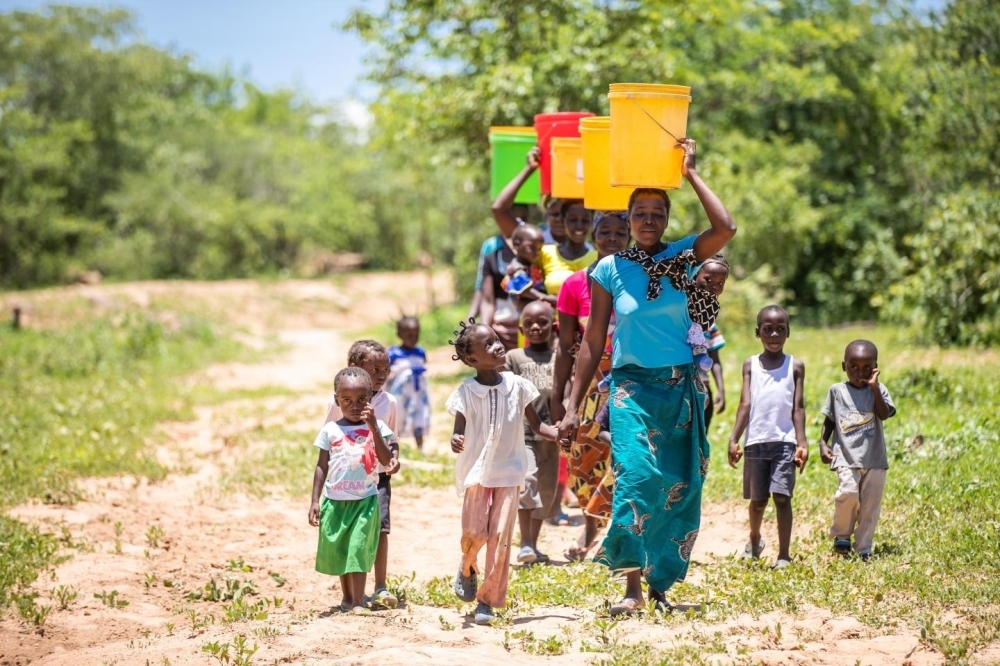Africa’s children under threat from climate crisis.
Extreme weather events and rising temperatures create knock-on effects that threaten the wellbeing of Africa’s children.
Among the effects are increased poverty, child labour, severe malnutrition, lack of access to clean water, health and sanitation facilities, child marriage and higher rates of school dropouts.
African governments urgently need to step up their financial investment and economic policies to prevent and respond to the effects of climate change on African children, according to a statement issued on behalf of the African Child Policy Forum (ACPF).
It points out that Namibia is among the nine countries in Africa in which 11 million people, including children, are food insecure.
The statement notes that in sub-Saharan countries, 490 million children in 35 countries are at risk from the worst impacts of climate change.
Child rights campaigners have warned that the climate crisis in Africa undermines the rights of children to life, health, education and security, while increasing the risks of violence and exploitation.
Crisis
More than 200 child rights experts, civil society organisations, academics, and high-level United Nations and African Union officials met in Addis Ababa, Ethiopia, on 6 September for the start of the 9th International Policy Conference (IPC).
The conference aims to put Africa’s children at the centre of the climate agenda and calls for urgent and greater efforts to prevent and respond to the effects of climate change on African children.
"Half of Africa’s population is under the age of 20. They are the ones who will suffer most from extreme weather events and climate-related disasters, from the long-term impacts of increased poverty, lack of investment, and inadequate infrastructure," said Dr Joan Nyanyuki, executive director of ACPF, which organises and hosts the IPC.
“The climate crisis is a major child rights crisis in Africa and could reverse the progress made so far.”
Future impact
According to a recent analysis, sub-Saharan Africa accounts for 35 of the 45 countries globally at the greatest climate risk.
"Angola, Eswatini, Lesotho, Madagascar, Malawi, Mozambique, Namibia, Zambia and Zimbabwe are home to more than 11 million people, including children, who experience food insecurity caused by drought and flooding."
Graça Machel, chair of the ACPF board of trustees, says that by 2050, Africa will be home to one billion children and young people "who, given the right life chances, could power the continent’s social and economic renaissance."
However, she added that they will face a future of reduced employment, productivity and growth due to the economic impacts of climate change.
Nyanyuki said that the already heavy burden of malnutrition and disease among children in Africa is exacerbated by increasing drought, poverty, high food prices, displacement, and insect outbreaks that are all related to extreme weather events.
Among the effects are increased poverty, child labour, severe malnutrition, lack of access to clean water, health and sanitation facilities, child marriage and higher rates of school dropouts.
African governments urgently need to step up their financial investment and economic policies to prevent and respond to the effects of climate change on African children, according to a statement issued on behalf of the African Child Policy Forum (ACPF).
It points out that Namibia is among the nine countries in Africa in which 11 million people, including children, are food insecure.
The statement notes that in sub-Saharan countries, 490 million children in 35 countries are at risk from the worst impacts of climate change.
Child rights campaigners have warned that the climate crisis in Africa undermines the rights of children to life, health, education and security, while increasing the risks of violence and exploitation.
Crisis
More than 200 child rights experts, civil society organisations, academics, and high-level United Nations and African Union officials met in Addis Ababa, Ethiopia, on 6 September for the start of the 9th International Policy Conference (IPC).
The conference aims to put Africa’s children at the centre of the climate agenda and calls for urgent and greater efforts to prevent and respond to the effects of climate change on African children.
"Half of Africa’s population is under the age of 20. They are the ones who will suffer most from extreme weather events and climate-related disasters, from the long-term impacts of increased poverty, lack of investment, and inadequate infrastructure," said Dr Joan Nyanyuki, executive director of ACPF, which organises and hosts the IPC.
“The climate crisis is a major child rights crisis in Africa and could reverse the progress made so far.”
Future impact
According to a recent analysis, sub-Saharan Africa accounts for 35 of the 45 countries globally at the greatest climate risk.
"Angola, Eswatini, Lesotho, Madagascar, Malawi, Mozambique, Namibia, Zambia and Zimbabwe are home to more than 11 million people, including children, who experience food insecurity caused by drought and flooding."
Graça Machel, chair of the ACPF board of trustees, says that by 2050, Africa will be home to one billion children and young people "who, given the right life chances, could power the continent’s social and economic renaissance."
However, she added that they will face a future of reduced employment, productivity and growth due to the economic impacts of climate change.
Nyanyuki said that the already heavy burden of malnutrition and disease among children in Africa is exacerbated by increasing drought, poverty, high food prices, displacement, and insect outbreaks that are all related to extreme weather events.




Comments
Namibian Sun
No comments have been left on this article